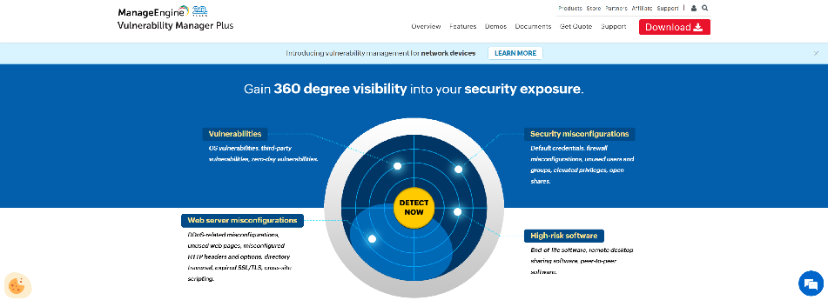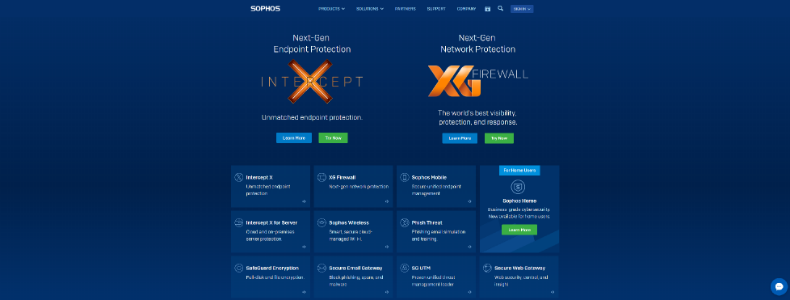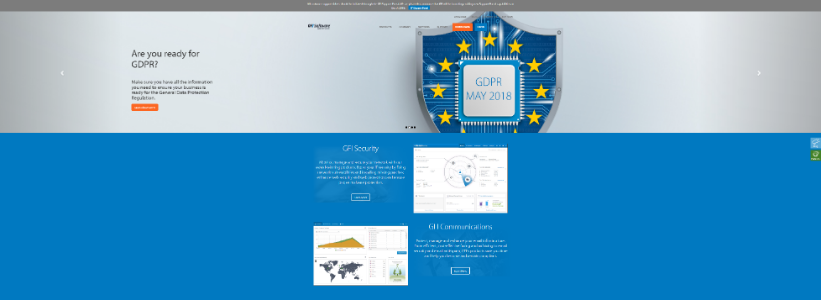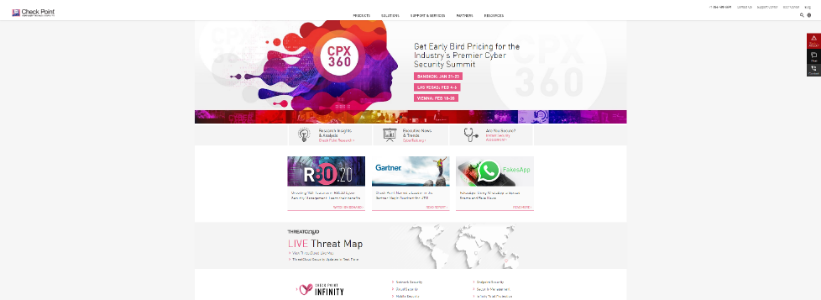Top 7 Small Business Network Security Software
Network security is a clear and growing concern to the security of today Internet-connected enterprise networks, information systems and hosts. It is a complicated subject, always tackled by the security experts. However, as more and more people become wired, an increasing number of people need to understand the basics of the network security in this interconnected world.
Read More: Best Endpoint Security Software For Small Business
Network security is the set of policies and provisions adopted by well qualified experts to monitor the electronic communications, to prevent the unauthorized accesses, to oversee the network operations, to detect the suspicious activities, to ensure the network accessibility to the resources, and to manage the entire security of the enterprise environment.
Network security covers the communications and the transactions conducted among private companies, government institutions and individuals. So, the networks to be protected can be private, such as within companies, and public which might be open to the Internet. These networks are subject to many types of threats and attacks from malicious sources and these attacks can be from two types: passive when an attacker intercepts data transferred through the network, and active in which an intruder run commands to disrupt the networks systems. The possible network threats can be viruses, Trojan horse programs, vandals, data interception, denial of service and social engineering.
Read More: Top 20 Best Enterprise Endpoint Security Software Solutions
Viruses and worms are computer programs written by devious programmers and designed to replicate themselves trough the network and infect computers when triggered by a specific event. Trojans and Vandals are delivery vehicles for destructive code, which appear to be useful software application and harmless such as games but they are in reality destructive.
The forms of loss that can be attributed to the viruses, worms and Trojans are mainly:
- File deletion and disabling that can be a huge issue since there have been several worms that have attacked computers in this way. These worms penetrate your computer and then overwrite files with certain extensions, such as exe, jpeg and many other extension types. The Conficker worm was an example of a “file deletion and file disabling” type of worm.
- Stolen information is a serious threat often associated with malicious worms. The ability to steal information can come in many different virus types and the way they infect a computer can come in many different types and styles. The type of information stolen can range from something small like an email address or a password to a game, to huge threats like stolen social security numbers or stolen passwords to websites like bank accounts and workplace intranets.
- Lockouts can be serious, especially if the infected computer is of critical importance. You may have password locks on your computers and log in by typing in your password each time. Some worms may have the capability to discover these passwords and change them without your notice and prevent any future access to that machine.
- Mass hysteria and world panic are something that can be associated with computer worms, especially if the worms infect computers quickly and go unnoticed. An example of such a worm was the Morris worm. The Morris worm at one point was responsible for literally shutting down the Internet for a few days.
How to Combat Network Attacks
The network attacks try to collect data and to check the vulnerabilities that can be later exploited to compromise the network in order to gain entry to the email accounts, databases, information systems or corporate networks. A hacker can also intercept and alter data packets being transmitted on communication links or can simply perform a denial of service attack in order to prevent the access to part or to all parts of a the network. In practice, an effective network security strategy requires identifying threats and then choosing the most effective set of tools to combat them.
The recommended network security tools to be used are mainly:
- Antivirus software applications which are a set of packages that can counter most virus threats if they are regularly updated and correctly maintained.
- Secure network infrastructure devices such as routers and switches. These devices have hardware and software functions that enable secure connectivity, perimeter security, intrusion protection, identity services, and security management.
- Dedicated network security hardware and software tools such as firewalls and intrusion detection systems providing protection for all areas of the network and enabling secure connectivity between the network nodes.
- Virtual private networks provide access control and data encryption between two different computers on a network. This technology allows remote workers to connect to the network without the risk of a hacker or thief intercepting data.
- Identity service helps to identify users and control their activities and their transactions on the network. It consists of authenticating the users, with a username and a password, electronic identity or biometric access. Generally, the type of access depends on how critical the network services are and the combination of multiple types of access equates to what is called a two-factor authentication or multiple factor authentication. This combined mode provides a stronger authentication scheme since the user has to know, for example, the username/password and has match at the same time the biometric profile.
- Encryption ensures that messages cannot be intercepted or read by anyone other than the authorized communicating parties.
None of these methods alone will be enough to secure the entire network, but when they are layered together, they can be highly effective in keeping the network safe from attacks. Security management is the glue ensuring the identification and the mitigation of risks. It ensures the interrelationships among assessing risk, implementing policies and controls in response to the threats, promoting awareness of the expectations, monitoring the effectiveness of the controls, and using this knowledge as input to the risk assessment step.
Read More: Top 10 Penetration Testing Tools
Security is a multifaceted quality, since everyone has a different idea of what it is and, what is the acceptable level. The key for building a secure network is to define how important the security aspect is to your information system. Once that has been defined, everything that goes on with the network can be evaluated with regard to the security policy. At the end, it has been repeatedly proved that the ultimate goal is achievable only with everyone’s cooperation, correct security policy, effective procedures and consistent practices.
Top 7 Small Business Network Security Software:
MANAGEENGINE Vulnerability Manager Plus
ManageEngine Vulnerability Manager Plus is a prioritization-focused threat and vulnerability management software for enterprises offering built-in patch management. It’s a strategic solution for delivering comprehensive visibility, assessment, remediation, and reporting of vulnerabilities, misconfigurations, and other security loopholes across the enterprise network from a centralized console.
The assessment feature in Vulnerability Manager Plus allows you to identify vulnerabilities in their context to understand their urgency and impact so that you can promptly remediate imminent risks. You needn’t worry about the impacts of deploying patches or altering security configurations. The test and approve feature lets you test the stability of patches before rolling them out into the production environment.
Vulnerability Manager Plus is priced in such a way that it is the best suitable security management system software for your small-medium businesses. Vulnerability Manager Plus offers three editions namely Free, Professional and Enterprise. Pricing starts at 695 USD/year.

MANAGEENGINE Vulnerability Manager Plus
SOPHOS
Centralize Your Network Security with Sophos. Next-Gen Endpoint Security with Advanced Threat Prevention, Always-On Encryption, UTM Firewall Appliances, Mobile Management, Web and Email Gateway Appliances, Wireless Access Points, Server Virtualization and Network Scanning for Ransomware. Simple to Use, Deploy and Manage Security for Business, MSP Channel Resellers and OEM Technology Partners Worldwide.

SOPHOS
F-SECURE
F-Secure has been fighting for a safe and secure internet for over 25 years. We build award-winning anti-virus, online security and content cloud solutions to keep you safe at home, in the office, and while on the move.

F-SECURE
TRENDMICRO
Protect your small business with all-in-one solution that provides antispam, antivirus, web security, and email protection in one hassle-free bundle.

TRENDMICRO
GFI
GFI offers award-winning IT software and hosted services for network and web security, email security and web monitoring for small to medium sized businesses.

GFI
AVG
Protect your business today from hackers and viruses with AVG award-winning Internet security and network antivirus. For small business and Enterprise.

AVG
BARRACUDA
Barracuda Networks offers industry-leading network security products for data storage & disaster recovery, content security, and networking & application delivery.

BARRACUDA
CHECKPOINT
Check Point Infinity architecture delivers consolidated Gen V cyber security across networks, cloud, and mobile environments.

CHECKPOINT
Personal contact info – slikgepotenuz@gmail.com
Permanent Address :- Montville, NJ
CEO and co-founder at Cloudsmallbusinessservice.com